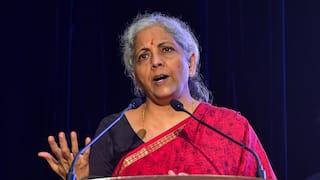Domestic workers, Gender Equality, and Women Empowerment

Bhopal (Madhya Pradesh) [India], Apr 26 (ANI): Domestic work has been one of the oldest jobs in the world. Due to various reasons like drought, lack of agriculture, lack of employment option, land acquisition in the name of development, displacement, harassment of Dalit class, lack of basic amenities like medical facilities, water, etc., people migrate from the villages to the cities.
These migrants are mostly poor and disadvantaged and they get work in the unorganized sector in the city. Women also have to work because of the high cost of living and poor economic conditions. Due to the lack of education and skill in women, the easiest livelihood for them is domestic work and they are forced to do it.
35 types of work classify as jobs for domestic workers. The work that fits into this category includes gardening, babysitting, cooking, sweeping, swabbing, dusting, washing utensils, washing clothes, attendants (for sick and elderly), drivers, security guards, car cleaning, etc. While some of these jobs are done by male domestic workers almost all the other jobs are done by women domestic workers.
According to the International Labor Organization (ILO), there are about six million domestic workers in India. According to the National Sample Survey 2011-12, there were 2,38,92,791 domestic workers in the country out of which 4,05,831 were women and 21,79,403 were working in the city.
In the five years between 1999-2000 and 2004-05, the number of female domestic workers increased by 22.5 lacs. For this reason, the share of women in working population has increased from 11.8 percent to 27.5 percent.
Domestic workers have to face many types of problems in both home and workspaces. On the one hand, they do not always get a happy atmosphere and support at home; on the other hand, the situation at their workplace is mostly that of discrimination and insecurity.
The society's view of domestic workers is not good in general. Their work is not considered dignified and their work is not given importance and they are considered to be servants instead of workers.
Employers of household workers from time to time give them stale leftover food, torn clothes, worn out shoes & slippers, etc. It hurts their self-esteem but they bear it silently believing it to be their fate. If there are incidents of sexual harassment with them in the workplace, the society also blames them.
Female domestic workers invest their entire earning in their families, yet they rarely have a say in the major family decisions. These women have to face domestic violence. Their husbands normally consume alcohol from their own wages, so the responsibility of running the whole house comes on these women's shoulders.
These women do not have any social or economic security. There are no domestic women workers associations or NGOs that come forward to help them. Therefore when there is injustice done to them, nobody comes forward to fight for them. In the absence of such organizations, their demands do not become known to the public.
Female domestic workers work for approx. 14 hours daily, thereby causing fatigue, joint pain, back pain, etc. Most of the time, during the work, their hands are in water containing detergents or phenyl, which causes wounds in the fingers. Usage of cold water in winters to wash clothes, utensils or swab the floor accentuates the development of arthritis in the fingers and hands of these women.
They are not allowed to use toilets in the workplace, due to which they drink less water, often due to this, they develop urine infections. Due to drinking less water, there is a possibility of kidney damage also.
There are many occasions when these women become victims of physical violence, sexual abuse, and inhuman behavior at the workplace. According to a research by Human Rights Watch, domestic servants in India have to face extreme harassment.
The women and child development department informed the Rajya Sabha in February 2014 that cases of violence are increasing with domestic workers in the country and between 2010 and 2012, 10,503 cases of domestic crime against domestic workers were registered, in which 3564 cases were registered in 2012, 3517 in 2011 and 3422 cases were registered in 2010.
If anything gets stolen in the house, then the first person to suspect is the domestic worker. These women do not get any facilities like weekly off, annual vacation, maternity leave, sick leave, insurance, social security benefits etc., like other workers. If there is an accident at the workplace, the employer does not pay for the medical treatment of the worker.
The contribution of domestic workers in the country's economy is never assessed; they are not given a status of workers. Because of this, they do not have any specific pay scale and do not enjoy pay hikes or allowances like workers in other sectors. The wages given to domestic workers are less than the minimum wages in the country.
Placement agencies make a lot of false promises of them getting big salaries and allowances and bonuses and then they sometimes exploit them financially and also physically.
Efforts by the Central and State Governments
In order to safeguard the rights of the domestic women workers, in 1959 a Bill called Domestic Workers (Conditions of Employment) was introduced, which could not be passed. Again, the Unorganized Workers Safety Act 2008 (domestic workers also included) did not implement its provisions properly. The International Labor Organization announced the rights and policies, principles of domestic workers in the domestic workers' convention on June 16, 2011.
The International Labour Organization (ILO) has also drawn specific attention to domestic workers, who have a right to "enjoy effective protection against all forms of abuse, harassment, and violence".
In the year 2015, Labor Welfare has drafted a national policy for domestic workers in which the minimum wage, hours of work, annual leave with salary, medical leave, maternity leave, social security, accident and health insurance and protection from sexual abuse, were to be included in the contracts between domestic workers and their employers.
The National Health Insurance Scheme was announced in this year's budget which will cover 10 crores 'vulnerable' families. The health coverage of the scheme will be up to Rs 5 lacs per family per year for secondary and tertiary hospitalization. Domestic workers have been included in the Sexual Harassment of Women at Workplace (Prevention, Prohibition, and Redressal) Act, 2013.
Minimum wages have been fixed for domestic workers in seven states of India, namely, Andhra Pradesh, Bihar, Jharkhand, Karnataka, Kerala, Orissa, and Rajasthan. Kerala, Tamil Nadu, and Maharashtra have constituted the Domestic Workers Welfare Board; Chhattisgarh Government has given them the status of labourer.
In Madhya Pradesh, under the Chief Minister's Urban Domestic Working Women Welfare Scheme the female domestic workers are registered and provided social security, education, health treatment, maternity leave, and insurance.
Domestic workers have not been given the status of labourers. This is the reason that the women who work as domestic workers have been neglected for minimum wages, hours of work, protection from occupational hazards etc.
Domestic workers are poor, deprived and belong to lower classes and do not have the strength and neither have the freedom to speak. In such situations, the employer exploits the cheap and easily available labour.
Domestic workers are not getting good wages or better work environments, there are no regular working hours, they have to face violence, abuse, sexual harassment at workplace, exploitation by brokers and placement agencies; forced migration; there is a lack of welfare schemes; they are faced with major problems like lack of opportunities to move forward.
The biggest problem is that they do not have any organization, because they have little or no bargaining power and they cannot even raise their issues properly.
In the Sustainable Development Goals - Gender equality and empowerment of all women and girls is to be achieved by 2030. The Government of India has committed to this. Therefore, the government will have to make serious efforts to recognize domestic workers as women and to give importance to their work.
For this, the government will have to bring out a national policy at the earliest for domestic workers, by providing skill development training; there should be a legal contract between employers and domestic workers.
Every female domestic worker should be mandatorily given information regarding sexual harassment in the workplace. The government has to create more and more welfare schemes such as a discount for a smart card to travel in public transport or lower rate of interest on bank loans.
At the same time, domestic workers must be organized to fight for their rights and they will have to link themselves to the wider struggle of the workers, only then they and their work will be given honor and respect.
SDG 5 - Achieve gender equality and empower all women and girls
5.4 Recognize and value unpaid care and domestic work through the provision of public services, infrastructure and social protection policies and the promotion of shared responsibility within the household and the family as nationally appropriate
5.5 Ensure women's full and effective participation and equal opportunities for leadership at all levels of decision making in political, economic and public life
5.a Undertake reforms to give women equal rights to economic resources, as well as access to ownership and control over land and other forms of property, financial services, inheritance and natural resources, in accordance with national laws
5.c Adopt and strengthen sound policies and enforceable legislation for the promotion of gender equality and the empowerment of all women and girls at all levels
The views expressed in the above article are that of Upasana Behar of Charkha Features. (ANI)
This story has not been edited. It has been published as provided by ANI




























